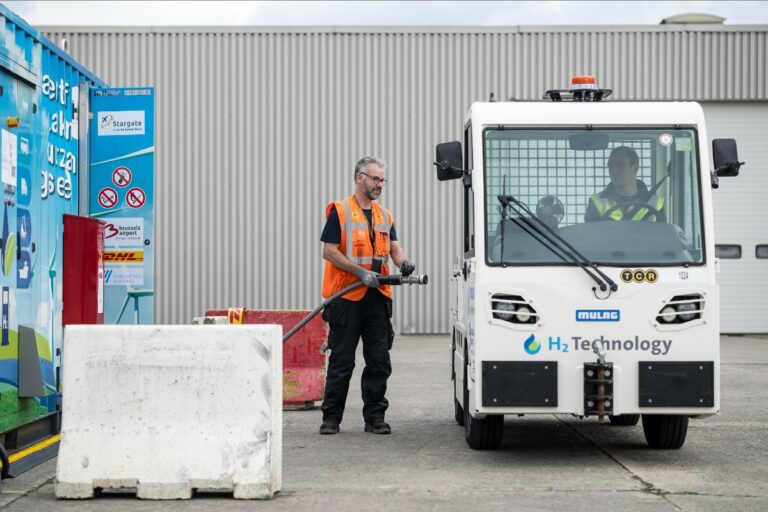Brussels Airport and Stargate EU Green Deal project partners VIL and DHL are currently testing a hydrogen refuelling station and a hydrogen-powered Mulag at Brussels Airport.
This hydrogen pilot for ground handling, a first for the airport, should give all the involved partners insights into the potential of hydrogen as an alternative fuel. Just like electric ground handling equipment, the use of hydrogen significantly reduces both emissions and noise impact of ground operations.
READ: AUTOMATION’S IMPACT ON THE FUTURE OF PILOTS AND AVIATION
Earlier this month, a mobile hydrogen refuelling station was installed on the tarmac at Brussels Airport by VIL, in collaboration with WaterstofNet, to test hydrogen as a fuel for ground handling operations. This pilot is part of the Stargate project, a project of Brussels Airport with a consortium of 21 partners, to develop innovative solutions for sustainable airports and aviation.
DHL is testing the first hydrogen prototype for ground handling operations, a Mulag towing tractor with an integrated hydrogen fuel cell system. The towing tractor for the transport and loading of cargo, is refuelled with hydrogen using the mobile station on site. The fueling and operations are conducted by trained and certified operators, as the project includes comprehensive training for users, logistics managers, mechanics, fire brigade, and health and safety personnel.
Hydrogen and electricity as alternatives for ground handling
The goal of this pilot is to evaluate the potential of hydrogen as an alternative fuel for ground handling equipment, next to electric ground handling equipment, and to gain insight into the necessary procedures to use this fuel at an airport. This test will serve as a model for other partner airports within the Stargate project, offering valuable insights into permit application processes, safety requirements, and operational experiences for all airport partners. The test will run for six weeks, until June 27th.
READ: E-COMMERCE FACES AUSTRALIAN HURDLES
Just like electric ground handling equipment, hydrogen fuelled vehicles have no CO2-emissions and noise impact, which benefits both local residents and airport personnel. One of the benefits of hydrogen is that vehicles can be fuelled instantly, which can be interesting for certain operations and makes them less dependent on the electricity grid. This initiative is an important step towards the broader adoption of hydrogen technology in aviation, paving the way for a more sustainable future.



